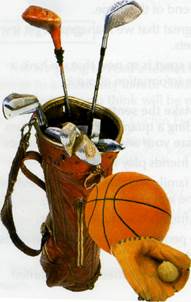b Look at the highlighted phrases in the text and match them with uses a-d above.
Find adjectives in the article with these meanings.
1 having special skills or knowledge of a
subject (line 11)
2 annoyed or upset about something that
is not acceptable (line 30)
3 very great or impressive (line 33)
4 not allowed by the law (line 42)
5 very determined to succeed or get what
you want (line 45)
6 sudden, surprising, exciting and
impressive (line 46)
7 doing a sport or activity as your job
(line 48)
fifty years ago last week an American woman died of cancer in Texas. She was arguably the best sportswoman ever, anywhere in the world, and she lived at a time when sporting ability was considered to be the province of the male. Jon Henderson 5 recalls the amazing life of Babe Didrikson, who could run, jump, throw, hit, swim - and sew - better than anyone.
You cannot help but feel just a little sorry for George Zaharias, even if he was a 20-stone wrestler with cauliflower ears. This is how Time magazine reported his wedding in 1939: 'Married. 10 Mildred ("Babe") Didrikson, famed woman athlete, 1932 Olympic Games track and field star, expert basketball player, golfer, javelin thrower, hurdler, high jumper, swimmer, baseball pitcher, ... and George Zaharias, heavyweight wrestler; in St Louis.'
15 The marriage notice might have added that Didrikson was also expert at cooking, sewing - she won first prize at the 1931 Texas State Fair for her box-pleated dress - and harmonica playing ... Asked if there was anything she did not play, Didrikson shot back: 'Yeah, dolls.'
20 Didrikson, who was christened Mildred and became Babe because of Babe Ruth-like feats at baseball, was the sixth child of seven born to Ole, a Norwegian ship's carpenter, and his wife, Hannah. The first three children were born in Norway; Babe and the other three arrived when the family settled in
25 Port Arthur, Texas.
Didrikson began her sporting career before graduating from high school. Then, at the 1932 Amateur Athletic Union track-and-field championships, Didrikson won the team award by finishing first in six events and setting five world records.
30 She was disgusted that she was allowed to compete in only three events at the Olympics that followed. It was at these games that the 21-year-old announced to a world audience he phenomenal ability: 'I am out to beat everybody in sight and that's just what I'm going to do,' she said when she stepped
35 off the train in California.
[ GRAMMAR: definite and zero articles

|
A Find these phrases in the article and match them with the uses of the definite article below.
1 the family settled in Port Arthur ... (line 24)
2 the Olympics that followed, (line 31) / the sporting scene in the
US. (line 50)
3 Didrikson won the team award ... It was at these games that the
21-year-old ... (line 32)
4 the best sportswoman ever (line 2)
We use the definite article when ...
a) a noun is defined by a phrase that follows it.
b) it is obvious from the context what is referred to.
c) we mention the noun a second time or use a substitute noun.
d) we refer to something unique (including superlatives).
b Look at the highlighted phrases in the text and match them with uses a-d above.